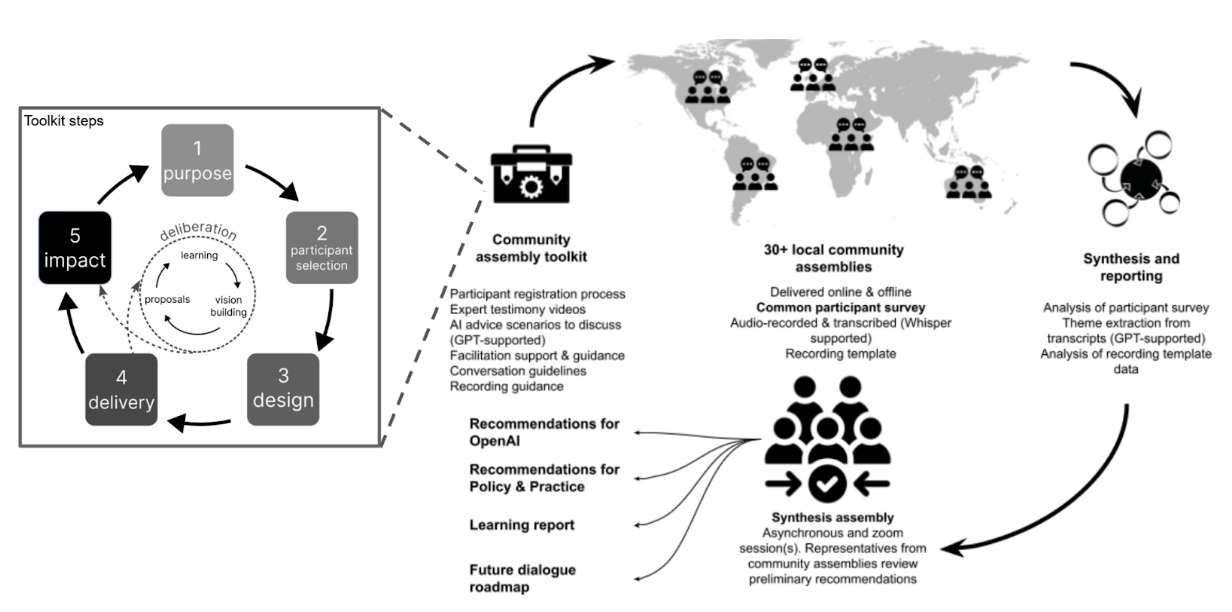Global, national, local
Over the last few weeks our work has taken us from thinking about some of the biggest global policy processes that set the framework within which data is governed, down to considering the highly contextualised and local ways in which collective and participatory data governance might be put into practice.
In these weeknotes, written against the clock on a train down into London for our first ever full team retreat, I’ve tried to reflect on some of these themes.
Global
In San Jose, Costa Rica on the 4th June alongside RightsCon, with partners from Aapti Institute, Datasphere Initiative, Research ICT Africa and Consumers International we brought together 15 researchers, advocates, practitioners and community-builders from civil society across the world for a policy design lab, with a focus on thinking about the kinds of data governance frameworks that might be socialised and promoted through international fora and processes like the G7, G20, UN Summit for the Future and Global Digital Compact, and through the myriad of spaces such as the IGF, ITU, WTO, UNCTAD and so-on. We published the workshop report earlier this week.
These international fora can have a powerful role in agenda setting: shaping agendas around data and its potential, outlining shared priorities for action across member countries, and sparking the creation of new initiatives. Notably, at the Data Justice 2023 conference, we heard a number of presenters talk critically of the data discourse being produced through spaces such as the G7 and G20, and by agencies such as the World Bank (albeit perhaps treating them somewhat monolithically, and not recognizing promising groundwork such as the 2021 World Development Report’s call for a new social contract around data). Briefly looking at recent G20 communiques shows that, although digital and data are consistently present and cross-cutting topics, there is little emphasis on giving voice and power to those affected by datafication, or exploring data governance beyond data protection.
Given so many of the points at which datafication touches the lives of individuals involve cross-border data flows, and given the evident geopolitical factors affecting how nations, including the UK, are positioning their data governance regimes, understanding and engaging with global frameworks of data governance is, I think, vital to Connected by Data’s work. However, we’ve got a lot more to explore in terms of understanding how different global spaces are shaping data discourse and frameworks, and this is likely to be a focus for some of our research in coming months.
At the same time, the interaction of national and global is not a one-way flow. Shaping national policies and agendas is critical for the global debate. While there are generally some formal spaces for civil society participation in global processes, whether through open consultations, thematic working groups, or standing groups like the Civil20, or Think20 think-tanks process, that inform G20 decision making, governments generally still hold the pen on communiques and outcome documents. Getting text into process outcomes may require government champions.
National
At the end of May we held another design lab, this time focused on narratives around data governance. Whilst not neglecting the global, this had a more national flavour – looking at the stories being told about data in particular national contexts, and how these shape debate. As we look forward to collaborating with Global Voices on their upcoming Future of Data Observatory, we’ll also be digging more into exactly how data-related stories are told and received differently in different countries.
The rest of the Connected by Data team have also been active looking at UK policy, with an event in Parliament this Monday looking at the Data Protection and Digital Information Bill through the lens of workers’ rights, and putting together a response to the UK’s AI White Paper, as well as moving forward our work around progressive manifesto commitments on data and digital.
And off the back of our Policy Lab work, an in light of the next G20 presidency sitting with Brazil, I’ve been talking with Maria and some of our partners about how calls for collective data governance might be framed in the Brazilian context: drawing on priority themes of environmental justice, current political realities, and the country’s legacy as a leader in participatory practices such as participatory budgeting.
My (unsurprising) take away from all these discussions is that, while global frameworks will be critical to support a shift to better models of data governance, there are significantly different drivers and agendas in each country.
Local
On Tuesday this week we ran the first public playtest of a game we’ve been building to explore participatory data governance practice. The game, (working title: Governance Stack) invites participants to think about the particular methods of engagement that might fit their data governance context: from surveys and feedback forms, to citizens juries and co-design activities.
Working through the game has reinforced the point that there is no one-size-fits-all approach to embedding participatory data governance: and so there is a critical design challenge for national and global policy frameworks that can enable, and enforce, voice of those affected, whilst avoiding being over-prescriptive or narrow in how this should take place.
This perhaps points to the importance of work on articulating ‘data rights’ that can be claimed in different contexts, or the global ‘peremptory norm’ approach advocated by the Global Data Justice project that provides a common frame for local struggles. At the same time, thinking about a myriad of local contexts might help in the design of enabling tools like transparency, and redress mechanisms.
Other things
The themes above have also been present in a couple of other strands of work over the last month, including:
Measuring Data Values – we’ve been working with IDRC and the GPSDD Data Values project to explore how comparable country data from the Global Data Barometer might be useful to support national level advocacy around the data values agenda. I had the opportunity to join a workshop in Washington looking at the design of the next edition of the Global Data Barometer, and have been blogging learning from the project, including a spin-off-piece about the potential impact of Large Language Models on expert survey methods.

Photo of Global Data Barometer design workshop at the OpenGovHub in Washington.
Open Government Partnership National Action Plan proposals - we responded to an open call from the UK Open Government Network for ideas that might form part of the next UK Open Government National Action Plan. The two ideas we submitted (which you can find by searching for Connected by Data in the published long-list of ideas) focussed on an enhanced standard for transparency of data collection, use and algorithmic processing (building on discussions from the Costa-Rica policy lab) and the creation of standing citizens juries within regulators to provide ongoing access to public deliberation on complex technology topics.
We’ve also been thinking about how we might use our design labs model to support development of model commitments on data governance to feed into the OGPs new focus on digital governance.
Democratic inputs to AI – we’ve been working with Iswe Foundation to develop a proposal in response to Open AI’s call for experiments on democratic inputs to AI models. Our proposed approach rejects the idea of asynchronous or virtual conversations, in favour of an emphasis on deliberative group dialogues. Excitingly, the proposal is linked to plans being developed for a standing Global Citizens assembly that could provide a powerful forum for ongoing citizen input into global processes on technical topics, where input in the past has always been mediated by special interest CSOs.

Methods and cases - I’ve finally (months late, and still very much in beta!) got some of our case studies of collective and participatory data governance live on the website here. After getting tied up in knots trying to design a good way of presenting these, we’ve settled for now with just publishing via AirTable - and are thinking about how best to develop this work in future to balance out the parallel goals of providing inspiring examples of practice, and providing critical analysis that can inform practice advice and guidance. I have a hunch the work we’re doing in the Participation Design Lab on developing the game will dovetail with this, and where we finally end up on presenting cases might be quite different from the ideas I was exploring way back in May and June last year.
Team news
It’s also been a busy month with the team. Obi left us at the end of May, Helena joined to take a lead on our field-building work and has hit the ground running bringing a wealth of ideas, insights and contacts, and it’s been great to have time working face to face with Maria after our first six-months being all remote, first at RightsCon in Costa-Rica, and this week in Cardiff, Stroud and London. Plus, we had the full team together yesterday for the first time ever, which Emily has aptly summed up through judicious use of a selfie-stick here.
